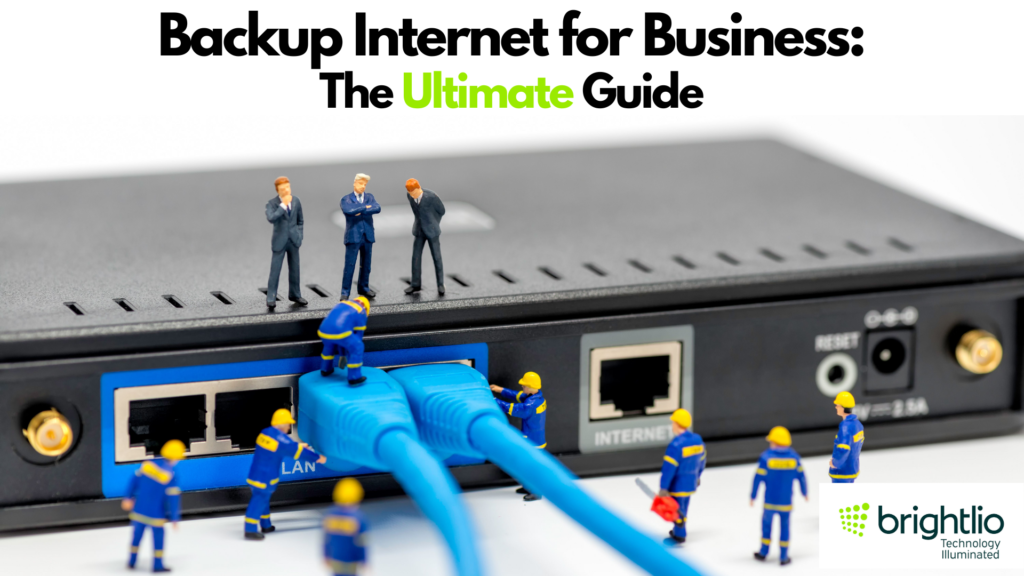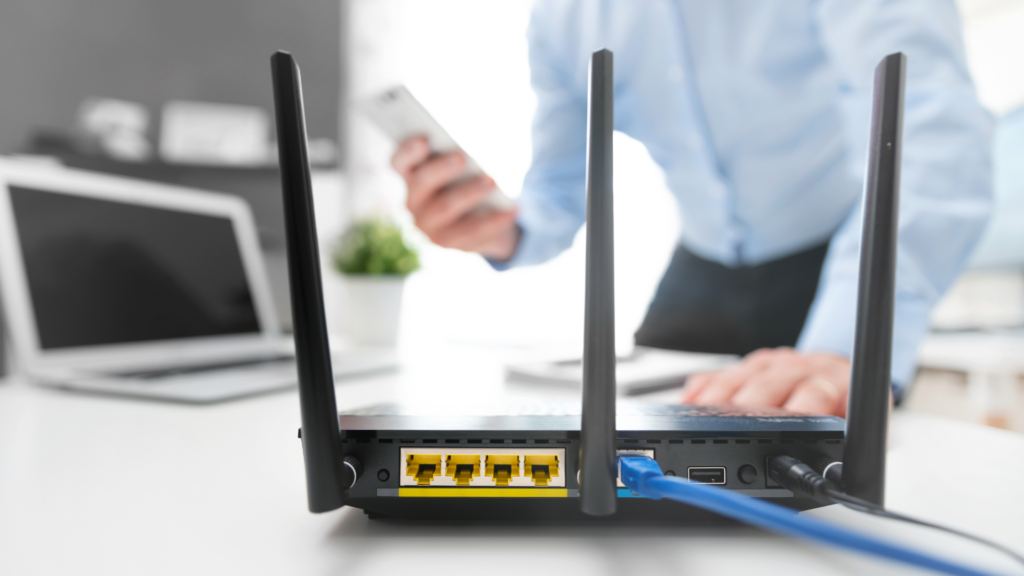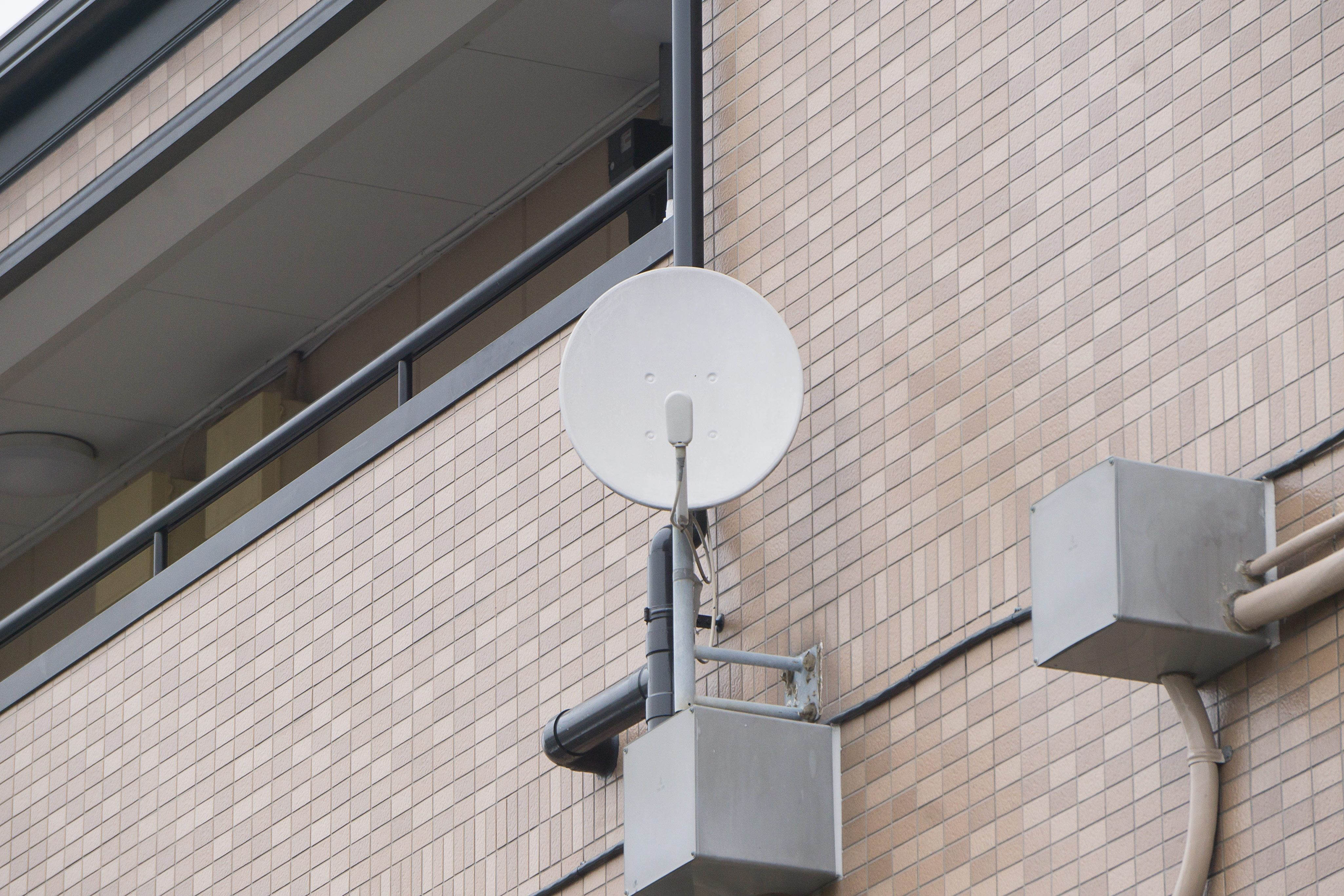
Table of Contents
Backup Internet for Business: The Ultimate Guide
In an increasingly connected world, internet outages can significantly impact businesses. According to a survey by SolarWinds Pingdom, 98% of organizations say that an hour of downtime costs over $100,000. With a backup internet solution, businesses can minimize downtime and keep operations running smoothly. This article focuses on the importance of backup internet connectivity for business, the different types of backup internet connections, and how to choose the right solution.
Short Summary
- Backup internet is essential for business continuity and productivity.
- When selecting a provider, businesses should assess speed, reliability, cost, scalability, and carrier diversity.
- Backup internet connection options include broadband, dedicated, 4G/5G, fixed wireless, and satellite.
- SD-WAN increases the value of a backup internet connection
- Brightlio can quickly deliver business internet quotes that meet your needs and budget.
Let’s get started!
What is Backup Internet?
Backup or redundant internet connectivity is a secondary internet connection set up to ensure continuous internet service when your primary service provider has a network outage. A backup internet connection for business provides uninterrupted online services, upholds your brand’s reputation, and preserves productivity.
Gartner estimates that the average cost of network outages is $5,600 per minute or $336,000 per hour. Even for small businesses, an internet outage has a meaningful cost. Purchasing a backup internet service is an excellent investment for most organizations.

Key Considerations in Choosing a Backup Internet Solution
When you choose a backup internet solution for your business, you must account for several important considerations. Your choice will significantly impact your operations and expenses, so making an informed decision is crucial.
Reliability and Performance
The reliability and performance of the backup connection are crucial factors. Your backup internet should be reliable enough to provide uninterrupted service when the primary connection fails. In terms of speed and bandwidth, the backup connection should be able to support your business operations until the primary connection is restored. While it might not need to match the speed and capacity of your primary connection, it should at least be able to support your critical operations.
Keep in mind that a power outage will also cause your backup router or cable modem to lose power. It is important to invest in battery backup for your secondary service so that you stay connected.
Cost Effectiveness
The cost of the backup solution is another factor to consider. While having a backup internet connection is essential, it should be cost-effective and fit within your budget. Internet backup costs vary based on the service offering, bandwidth, and geography. You’ll need to balance the cost with your specific needs and the potential cost of downtime for your business.
Carrier Diversity
Another vital consideration is carrier diversity. Carrier diversity means using different internet service providers for primary and backup internet connections. This strategy provides an extra level of redundancy because it reduces the likelihood of both connections failing simultaneously.
If both your primary and backup connections are with the same provider, a widespread issue with that provider could leave you without internet failover. However, with diverse carriers, if one provider experiences an outage, the other will unlikely be affected simultaneously.
When evaluating diverse connections, it is also essential to consider the path each carrier takes into your facility. If both carriers take the same path, damage to one connection will likely lead to damage to both. For this reason, data centers and large office buildings typically offer multiple internet provider paths into their facilities.
Geographical Considerations
The geographical location of your business can also significantly impact your backup internet options. For example, if you’re in a remote area, your options may be limited, and you might have to consider solutions like satellite or fixed wireless internet.
Scalability
Finally, consider the scalability of the backup solution. As your business grows, your internet needs will likely increase. The backup solution you choose should be capable of growing with your business.

Exploring Backup Internet Options for Your Business
There are numerous backup internet options for businesses today. Each option has its own benefits, drawbacks, ideal use cases, and costs. Understanding these can help you identify the most suitable solution for your requirements and budget. Let’s dive in.
Broadband Backup Internet
Broadband is a high-speed internet connection that provides fast and constant access to the internet, using different mediums like DSL, cable, or fiber optics. Unlike dedicated internet, which provides a fixed amount of bandwidth to a single user, broadband bandwidth is shared among multiple users. This can result in slower speeds during peak usage times.
Broadband backup internet service offers a blend of affordability and ease of setup, making it a popular choice among small and medium-sized businesses.
Benefits:
- Cost-effective, making it an excellent choice for businesses with tight budgets
- Wide range of speeds to accommodate different business needs
- Easy to set up and generally reliable
Drawbacks:
- Speed and reliability can vary greatly depending on the provider and location
- Peak usage times may result in slower speeds due to bandwidth sharing
Ideal Use Case:
Broadband backup is ideal for small to medium-sized businesses that require a cost-effective solution and whose operations can withstand occasional slowdowns during peak usage times.
Expected Pricing for Backup Broadband Internet
Business broadband prices for backup internet vary based on location, speed, and contract length. Customers can expect to pay between $65 and $500 per month, with typical prices of $100 to $200 per month. Many broadband connections can be purchased on month-to-month terms, meaning you are not locked into a long-term contract.

Dedicated Internet Backup
Dedicated internet is a service that provides a fixed amount of bandwidth solely to a single user or business, resulting in a more consistent and reliable connection. Unlike broadband, where bandwidth is shared among multiple users, dedicated internet’s exclusive bandwidth allocation results in higher speeds and superior performance, especially during peak usage.
Benefits:
- Provides a consistent speed and performance
- Not affected by peak usage times
- Suitable for data-heavy tasks, cloud workloads, and SaaS-heavy applications
- More secure
Drawbacks:
- More expensive than other options
- The setup process may be more complex
- Longer term lengths in most cases
Ideal Use Case:
Dedicated internet is mostly used as a primary internet option. Large businesses, companies with heavy internet connectivity needs, and companies with on-premise data centers housing critical business applications are usually the best fit for dedicated backup internet.
Expected Pricing for Dedicated Backup Internet
Dedicated internet pricing varies even more than broadband. Some locations are already on network for dedicated internet providers, meaning the costs will be lower. Some will require expensive construction. In most cases, expect to pay at least $1,000 per month for dedicated internet, with prices reaching $5,000 per month or more. Also, expect longer-term contracts (12 to 60 months), especially where construction is required.

4G/LTE/5G Cellular Data Backup
4G/LTE and 5G are standards for cellular networks, offering wireless internet connectivity over the same networks used by mobile phones. These networks provide widespread coverage and are increasingly capable of high-speed, low-latency connections. Unlike landline-based solutions like broadband or dedicated internet, 4G/LTE and 5G allow more flexibility and mobility. However, they can sometimes face limitations in data plan caps and performance.
Benefits:
- Provides widespread coverage
- Easy to install and setup
- Potential for high-speed, low-latency connections with 5G
Drawbacks:
- Data limits may apply depending on your plan and provider
- Connection speeds may be slower compared to wired connections
- Not available in all locations and prone to connectivity issues in some geographies
Ideal Use Case:
4G/LTE/5G backup service is ideal smaller businesses to stay connected during brief outage, and for businesses where traditional landline connections are unavailable. They are also companies requiring a portable or temporary backup solution. These offer great internet backup for retail stores, branch offices, small businesses, and home offices.
Expected Pricing for 4G/LTE and 5G
Pricing starts at around $50 per month for T-Mobile’s unlimited 5G business internet plan and $69.99 for a similar data plan, from Verizon. Based on bandwidth and geography, prices range up to about $250 per month. Many of these plans offer month-to-month contracts.

Fixed Wireless Backup
Fixed wireless backup is a point-to-point internet service that uses wireless signals to provide internet connectivity. This is accomplished by sending signals from a ground station to a fixed antenna at the user’s premises, bypassing physical cables.
Compared to broadband or dedicated internet, fixed wireless isn’t dependent on terrestrial infrastructure, making it particularly useful in areas with limited or poor-quality wired internet options. However, its performance is impacted by factors such as geographical obstacles or weather conditions.
Benefits:
- No need for cables, making it ideal for remote or hard-to-reach locations
- Can provide a reliable high-speed connection
Drawbacks:
- The connection can be affected by weather conditions and geographical obstacles
- Requires a clear line of sight between the ground station and the user’s antenna
- Requires installation of equipment, typically on the roof of your building
Ideal Use Case:
Fixed wireless backup is best suited for businesses areas without robust broadband infrastructure. It’s also a good option for businesses with premises spread over a large geographical area, like agricultural businesses or university campuses.
Expected Pricing for Fixed Wireless
Fixed wireless pricing is typically more than broadband but less than a physical dedicated internet connection. We commonly see pricing between $350 and $1,000 per month. There may also be a setup fee to install the antenna.

Satellite Backup Internet
Satellite internet is an internet service that relies on a satellite dish to send and receive data from a satellite orbiting Earth. Unlike landline or cellular connections, satellite internet can cover virtually any location, including remote or rural areas. However, it can have higher latency and may be influenced by weather conditions, and typically has data caps and slower speeds compared to other internet options.
Benefits:
- Availability in areas where other forms of internet connection may be limited or unavailable
- Provides an independent backup solution, not relying on terrestrial infrastructure
Drawbacks:
- Can be affected by weather conditions
- Typically has higher latency compared to other connectivity options
- It may have data caps and slower speeds
Ideal Use Case:
Satellite backup internet is ideal for businesses in remote areas where other internet connections are unavailable. It is also suitable for companies that require a truly independent backup solution separate from local infrastructure.
Expected Pricing for Satellite Internet
Sattelite internet is typically priced similarly to broadband. Based on your requirements, expect to pay between $50 and $300 per month. There is also usually an equipment rental fee for the satellite dish that is in the $15 per month range for most services. The provider may also require you to sign an annual contract.

The Synergy of SD-WAN and Backup Internet
Software-Defined Wide Area Networking (SD-WAN) is a revolutionary approach to network connectivity that optimizes and enhances the performance of a business’s network. Rather than relying on traditional, static network configurations, SD-WAN uses software to manage and route network traffic. SD-WAN allows you to efficiently balance traffic across multiple connections, seamlessly switch to backup links in case of an outage, and improve overall network performance.
SD-WAN amplifies the advantages of having backup internet by introducing intelligent and dynamic network management. SD-WAN uses software to control the connectivity, management, and services between colocation data centers and remote branches or cloud instances, making the network more flexible and responsive to the business’s needs.
SD-WAN’s intelligent routing can optimize bandwidth use by directing different types of traffic over the most suitable connection. Applications with lower latency thresholds, like unified communications and video conferencing, can be prioritized. This improves the performance of these business applications too.
One of the primary benefits of SD-WAN is its ability to manage multiple connections from MPLS to broadband to LTE, dynamically steering traffic based on the current status of each link. This feature is particularly beneficial when paired with a backup internet connection. In a primary connection failure, SD-WAN can seamlessly switch to the backup internet, ensuring uninterrupted network service.
Furthermore, SD-WAN’s capabilities are not limited to failover. SD-WAN allows you to bond multiple links together. This means you can simultaneously use the combined bandwidth of your primary and backup internet connection, delivering more bandwidth for your business.

Conclusion
In conclusion, having a reliable backup internet solution is crucial to ensure business continuity and protect your brand’s reputation. Whether you opt for broadband, dedicated internet, 4G/LTE/5G, fixed wireless, satellite, or point-to-point wireless, it’s essential to consider carrier diversity, reliability, performance, geographical location, cost, and scalability. Each option has its benefits and drawbacks, and the right choice will largely depend on your business needs.
Incorporating technologies like SD-WAN can further enhance your network resilience, providing an additional layer of assurance for uninterrupted operations. Investing in the right backup internet solution is more than buying an internet connection. It is securing the ongoing success of your business.
Brightlio Delivers Backup Internet for Business
Are you interested in exploring a backup internet connection for your company? Brightlio can help. As a telecommunications broker, we leverage our network of global partners to deliver the right solutions for your needs and budget. Typically, all we need is the address where you need internet service, and we can turn around options for you in less than an hour.
Additionally, we offer unified communications, SD-WAN, colocation, cloud, and advisory services. Our broad services offering means we can deliver a complete technology solution for your business.
Brightlio is committed to being your most trusted and responsive service provider. Contact us today to get started!
Frequently Asked Questions
What factors should I consider when selecting the best backup internet option for my business?
When choosing a backup internet option, you should consider several factors such as the geographic location of your business, carrier diversity, reliability, performance, cost, and scalability. You want a backup solution that offers adequate speed and capacity, is reliable, fits within your budget, and can scale with your business’s growth. Also, it is important to have different providers for your primary and backup internet to avoid simultaneous outages.
How does a backup internet solution help to ensure business continuity?
A backup internet solution ensures business continuity by providing an alternative path for internet access when the primary connection fails. This means your business operations can continue running with minimal disruption during outages. Especially for businesses with heavy reliance on online services or cloud-based applications, having a backup internet connection can significantly mitigate the risk of costly downtime and help maintain your business’s reputation for reliability.
How does internet failover work in the case of a full outage of the primary network?
Internet failover is a process that automatically switches your business’s internet access from the primary network to a backup when the primary internet connection fails. This could happen for several reasons, including power loss, human error, or issues with wired connections. When outages happen, the failover process ensures that your business stays connected, allowing you to stay productive and maintain critical operations. Options for backup connections can include solutions like fixed wireless broadband or a wireless connection through a 4G/LTE/5G network.
What are the primary causes of an internet outage?
Primary causes of a business internet outage can range from power outages to equipment failures. A power outage is one of the most common reasons for internet access loss, especially if there’s no battery backup in place for the networking equipment. This can instantly cut off your primary internet, leading to a significant business disruption.
Equipment failure is another key cause on an internet outage. This can happen due to a hardware malfunction, outdated equipment, or even due to damage from a power surge. When such a failure occurs, it can interrupt your primary connectivity, leaving your business without access to the internet.
Furthermore, issues with your internet service provider, like technical problems on their end or planned maintenance, can also result in a business internet outage.
Regardless of the cause, when your business loses internet connectivity, it can be highly disruptive and potentially costly. Therefore, having reliable backup internet connectivity in place is crucial to maintain business continuity.
Recent Posts
Vancouver Data Centers: Colocation in the Pacific Northwest
Business Broadband Solutions: The Ultimate Guide
Let's start
a new project together



